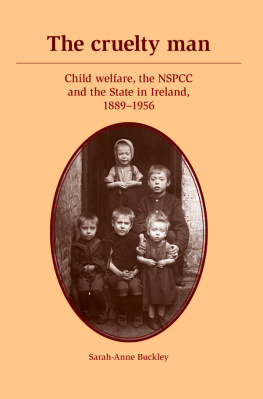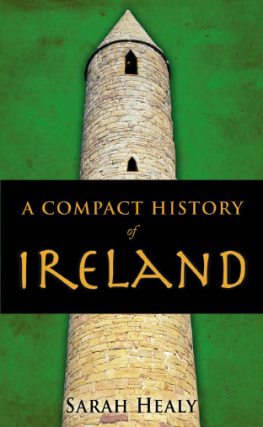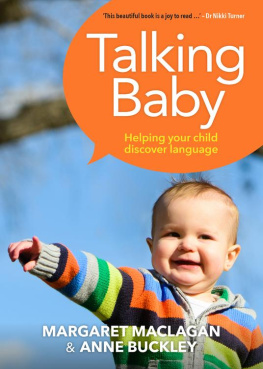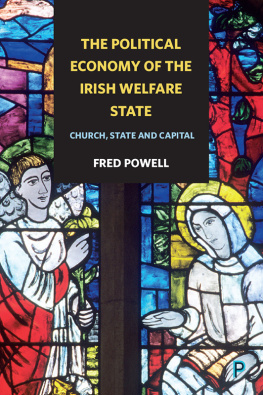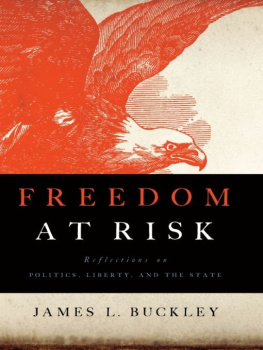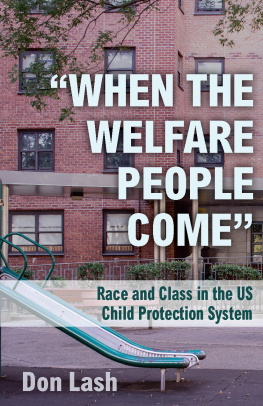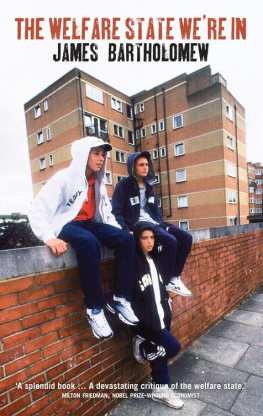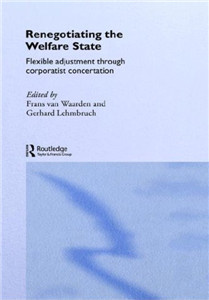The cruelty man
Child welfare, the NSPCC and the State in Ireland, 18891956
Sarah-Anne Buckley
Manchester University Press
Manchester and New York
distributed in the United States exclusively by Palgrave Macmillan
Copyright Sarah-Anne Buckley 2013
The right of Sarah-Anne Buckley to be identified as the author of this work has been asserted by her in accordance with the Copyright, Designs and Patents Act 1988.
Published by Manchester University Press
Oxford Road, Manchester M13 9NR, UK
and Room 400, 175 Fifth Avenue, New York, NY 10010, USA
www.manchesteruniversitypress.co.uk
Distributed in the United States exclusively by
Palgrave Macmillan, 175 Fifth Avenue, New York,
NY 10010, USA
Distributed in Canada exclusively by
UBC Press, University of British Columbia, 2029 West Mall,
Vancouver, BC, Canada V6T 1Z2
British Library Cataloguing-in-Publication Data
A catalogue record for this book is available from the British Library
Library of Congress Cataloging-in-Publication Data applied for
ISBN 978 0 7190 8766 0 hardback
First published 2013
The publisher has no responsibility for the persistence or accuracy of URLs for any external or third-party internet websites referred to in this book, and does not guarantee that any content on such websites is, or will remain, accurate or appropriate.
Typeset by Special Edition Pre-Press Services
For Eva
Contents
Note: Prior to 1922, tables refer to the thirty-two counties of Ireland, after 1922 they refer to the twenty-six counties, unless otherwise stated.
This book began as a PhD thesis at University College Cork (UCC), and was completed as I embarked on my academic career in National University of Ireland, Galway (NUI Galway). It is therefore the result of many peoples time, energy and support for which I am very grateful.
Firstly, I thank Donal Drisceoil, my supervisor at UCC. Throughout my undergraduate and postgraduate career, he encouraged me to look at history critically, to study topics I was passionate about and not to shy away from controversy. He is an excellent scholar, a mentor and a friend. Over the last number of years, the Department of History at UCC has been a central part of my life and has assisted me in many ways to which I am very grateful. In particular, I would like to thank Sandra McAvoy, Liz Steiner-Scott, David Ryan, Geoff Roberts, Charlotte Holland and all the administrative staff. I know that the friendships I have made there will continue to be a constant, and to Ruth Canning, James Ryan, Barbara ODonoghue, John Borgonovo, Gregory Foley and all the Davids Slinte I didnt know it was possible to talk history for so many hours until I met you all. To the staff in the Department of History at NUI Galway, you have all made me feel so welcome, I consider myself incredibly lucky to call Galway home now. As there are far too many excellent colleagues to single out, I want to say to them all that I look forward to the coming years and continuing to work in such a warm, vibrant and engaging department.
Thanks are due to the staff of the UCCs Boole Library and the National Archives of Ireland, in particular Dave, Brendan and Robert. Similarly, the staff of the Limerick Office of the Irish Society for the Prevention of Cruelty to Children (ISPCC) let me sit for hours, working my way through reports and files, and I thank in particular Suzanne and Aoife. As always, this would not have been possible without the funding I received as a postgraduate from the Irish Research Council for the Humanities and Social Sciences (IRCHSS). A number of people have guided me in developing this book from a thesis. Maria Luddy and James Ryan read the manuscript in its entirety, for which I am very grateful. At Manchester University Press, Tony Mason, Lianne Slavin and Corinne Orde have been a pleasure to deal with. To Vincent Browne, who kindly agreed to write the foreword, I am very thankful and as always a fan. To Jim Beresford well write the story of child imprisonment in depth one day soon; this book will only touch on the enormity of your and others experiences.
I am extremely indebted to my family and friends for their support while this work was in progress. To Jason, you believed Id finish this long before I did, thank you. Ciara Breathnach has encouraged this work and me for the last number of years to which I am, and continue to be very grateful. To Kate, ine, Alice, Sarah, Gerry, Mary, Graham, Elaine and San you all helped in so many different ways I hope to repay. To Adrian, you listened to me when I complained, took me away from it when I needed to get away, and made me feel loved all the time. Thank you.
Finally, to Mam, Dad, Lynn and Eva, thank you doesnt even begin. I wish I had the words to express how much you have helped and in so many ways. This is as much yours as mine.
Sarah-Anne Buckley
Vincent Browne
A hundred years ago, in 1913, William Martin Murphy, the owner of the Dublin United Transport Company, demanded that employees of the company forswear their membership of the Irish Transport and General Workers Union or face dismissal. The workers refused. William Martin Murphy locked them out of their place of employment, and thus began one of the most celebrated labour disputes in Irish history, involving 20,000 other Dublin workers who came out on strike in support of their transport colleagues.
The scale of poverty at the time among the working class in Dublin was already legendary. The dispute worsened the poverty, and children literally starved. A feminist, Dora Montefiore, instigated the evacuation of some hundreds of these starving children to the homes of sympathetic workers in Liverpool for the duration of the strike and, later, to the homes of Catholic working-class people in Belfast. The Catholic Archbishop of Dublin, William Walsh, stated that he had read of the initiative with nothing short of consternation. To Catholic mothers who were thinking of sending their starving children to Liverpool, he posed the question: Have they abandoned their faith?
In the ultimately successful effort to prevent these working-class children from being sent to Liverpool and Belfast for the duration of the dispute, one of the most prominent organisations was the Ancient Order of Hibernians, a Catholic secret society. One of its leaders was John Nugent. At a public meeting held to celebrate the successful blocking of the evacuation to Belfast, he said: We are patient with wrong; we are patient with poverty; we are patient with the violation of rights; but there is one thing that we are not patient with, for patience then would be a crime, not a virtue we have no patience with them who would deprive the little ones of their faith.
This book by Sarah-Anne Buckley shows vividly how patient the Irish establishment and the Irish Catholic Church were with poverty, starvation, and cruelty towards and abuse of children and women. That patience became perhaps the most striking feature of the new Irish Independent State and, arguably, remains so. The books focus is the National Society for the Prevention of Cruelty to Children (NSPCC), which became, in part, an agency for the infliction of cruelty on children, aided and abetted by the Irish State.
The book shows that in the first decades after independence parental rights were seriously eroded. It also traces how legislation on compulsory education, institutional provision, welfare and illegitimacy inflicted terrible hardships on poor parents and children. Children were taken from their parents very often simply because of poverty at a time when the State largely ignored poverty.


